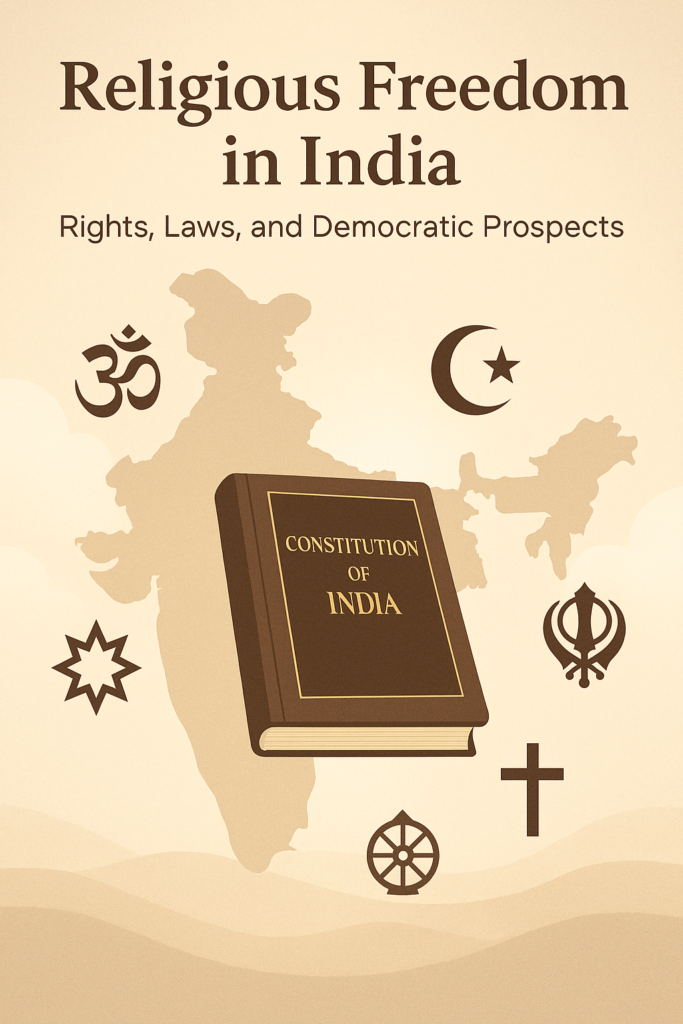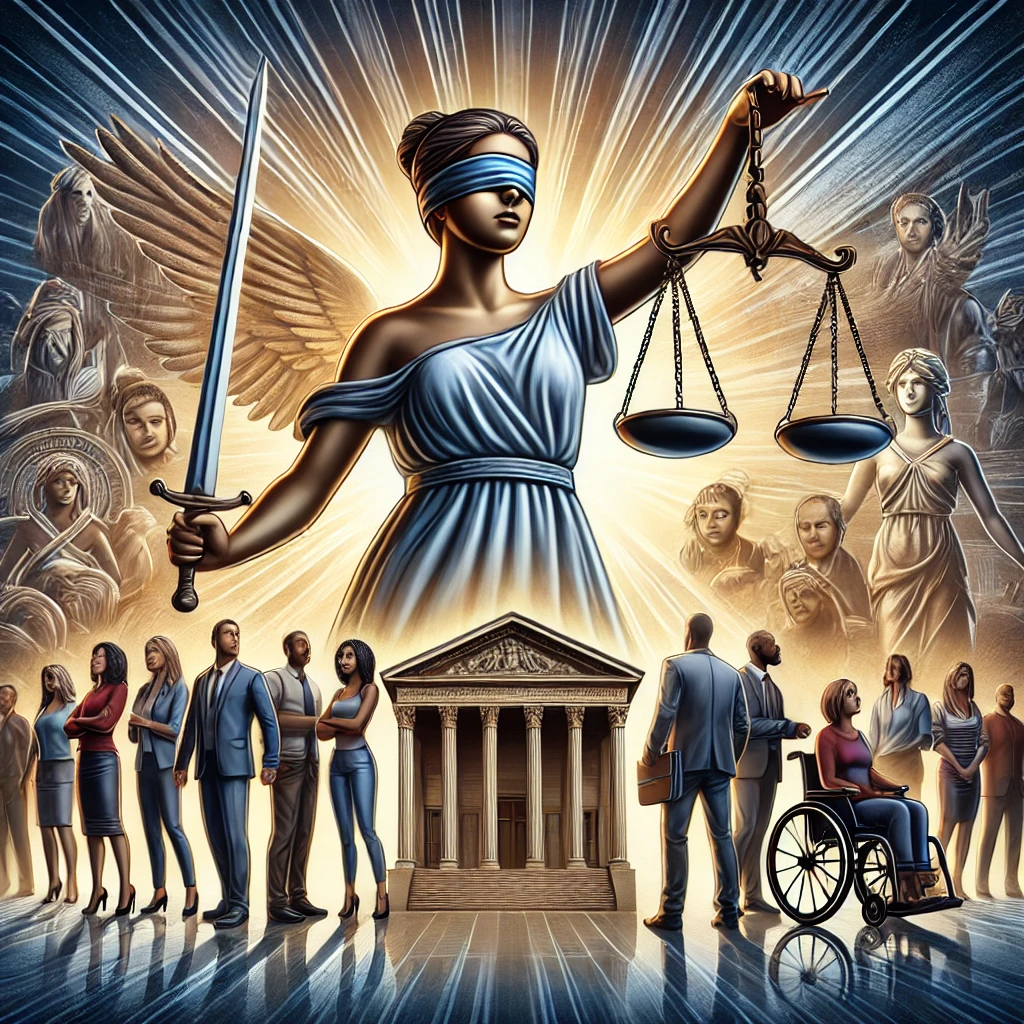
🕊️ Religious Freedom in India
India is one of the most religiously diverse countries in the world. From temples and mosques to churches and gurdwaras, faith plays a central role in the lives of millions. But with such diversity comes the need to protect every individual’s right to believe—or not believe—freely and equally.
This is where religious freedom, a core human right, becomes vital. It is protected by India’s Constitution and plays a key role in shaping a just and inclusive society. In this post, we’ll explore what religious freedom means in India, how the law safeguards it, and what prospects lie ahead for strengthening this right in practice.
Yet, the relationship between human rights and religious freedom is not always smooth. At times, religious practices may conflict with universal human rights, especially when they involve issues of gender equality, caste-based exclusion, or personal freedoms. For instance, practices justified in the name of religion can sometimes limit the rights of women or marginalized communities. This creates a delicate balance between respecting faith and ensuring that every individual enjoys equal rights and dignity under the law.
In such situations, reconciliation becomes key. Rather than seeing religion and human rights as opposing forces, we must work towards a dialogue that respects both individual belief and universal justice. The Indian Constitution provides a framework where religious freedom is protected, but also subject to public order, morality, and health. This makes space for reform and dialogue within traditions, while upholding the spirit of inclusivity and equality. By encouraging mutual respect and civic understanding, India can move toward a future where diversity is not just tolerated—but celebrated.

📜 What Is Religious Freedom?
Religious freedom means that every person has the right to:
- Choose and practice any religion
- Change their religion or choose not to follow any
- Worship and express their beliefs peacefully
- Be protected from forced conversions or religious discrimination
This is guaranteed under Article 18 of the Universal Declaration of Human Rights (1948) and reinforced in India through its constitutional framework.
🇮🇳 What the Indian Constitution Says
India’s Constitution strongly protects religious freedom. Key provisions include:
- Article 25: Right to freely profess, practice, and propagate religion
- Article 26: Right of religious groups to manage their own affairs
- Article 27: No tax can be used to support religious activities
- Article 28: No religious instruction in fully state-funded schools
These guarantees are the pillars of Indian secularism, which is unique: it doesn’t separate religion and state entirely, but ensures equal respect and treatment for all religions.
🌱 Positive Trends and Democratic Potential
Despite challenges, India has witnessed many positive efforts to uphold religious rights:
- The Supreme Court has affirmed religious freedom as part of the right to life and dignity.
- Community initiatives across India foster interfaith cooperation and dialogue.
- Public interest movements have defended rights in courts and civil society spaces.
These examples show that with the right policies, education, and awareness, religious freedom can be a tool for peace-building, social cohesion, and democratic renewal.
⚖️ Challenges to Overcome
While India’s legal framework is strong, religious freedom faces obstacles in practice:
- Lack of awareness about rights among the public
- Social prejudice or misinformation
- Misuse of laws to restrict interfaith interaction or expression
- Political polarization, which sometimes undermines inclusive values
Addressing these challenges requires both legal enforcement and a cultural commitment to pluralism.
📚 What Scholars Say
Leading thinkers offer powerful insights into how religious rights can thrive in a democratic society:
- Dr. B.R. Ambedkar – championed constitutional protections for all, beyond caste and religion
- Rajeev Bhargava – proposed a model of secularism that balances religious freedom with public interest
- Amartya Sen – highlighted the importance of tolerance and reasoned debate in The Argumentative Indian
- Martha Nussbaum – emphasized justice and dignity as the foundations of democratic rights in The Clash Within
Their work helps frame a hopeful vision where rights, respect, and reason guide public life.
🛤️ The Way Forward
Religious freedom is not just a legal guarantee—it’s a living principle. For India to remain a truly inclusive democracy, it must:
- Promote civic education about rights and responsibilities
- Encourage interfaith understanding and cooperation
- Protect individuals from discrimination or coercion
- Ensure governance remains fair, secular, and non-partisan
By doing so, India can realize the promise of its Constitution and set a global example of unity in diversity.
📖 Further Readings
- The Constitution of India – Government of India
- Secularism and Its Critics – Edited by Rajeev Bhargava
- The Argumentative Indian – Amartya Sen
- India After Gandhi – Ramachandra Guha
- The Idea of India – Sunil Khilnani
👤 About the Author
Dr. Anas Jameel, PhD in Human Rights, is an Assistant Professor at Integral University, where he teaches Indian Constitution, Politics, International Relations, and Political Thought. His academic work focuses on constitutional values, minority rights, and inclusive governance. Through research and teaching, he advocates for a more just and participatory democracy rooted in human dignity and equality.